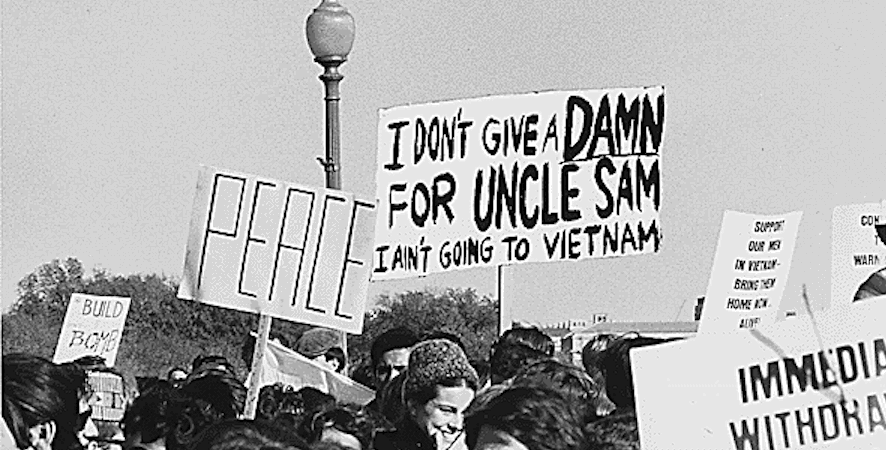I get lots of left wing stuff via the internet, mostly from the U.S. I read it because I consider myself basically left, and it contains types of criticism you don’t find elsewhere. The negative reactions to Ken Burns’ 10-part PBS series, The Vietnam War, have been copious. One writer said he wouldn’t bother watching but proceeded to rip the show apart anyway.
The basis for hostility includes the fact that among donors listed are the right wing Koch brothers and Bank of America. (Leftists like to say the P in PBS stands for Pentagon or Petroleum.) They retch over the early-on statement that the war “was begun in good faith, by decent people, out of fateful misunderstandings.” I concur, why hang around after that fatuous lying piety? Besides, I’ve always found Burns’ stuff — jazz, Civil War — pompous and dull.
So I tried surfing past it (I still tend to watch TV shows on TV) and each time, got hooked and stayed. Even if there was a Leafs-Habs game on (albeit an exhibition, but still Leafs-Habs) or a U.S. debate on health care, with Bernie — always such a relief in these times. This is the true test of a work: does it grip you so you can’t escape? It;s not whether you agree, nor whether it’s artful and brilliant. The question is: are you snagged? Reasoned analysis follows.
Maybe they tossed in that stupid line to siphon money from the Kochs. But they immediately leave it behind, as art often does. I worked with one great documentary maker, Allan King, and he could be like that. He’d say what he thought about one of his films; then you’d watch it and see something very different, possibly the opposite. His film spoke for itself and argued with him.
The Vietnam War abandons that early thesis and in fact all theses. It has multiple perspectives, it lays them out almost randomly, not bothering to reconcile them or even segue between. That jibes with my own experience at the time. I was in the U.S. for almost the entire 1960s, the last six years in New York. I was at events like the siege of the Pentagon, the Chicago Democratic convention, the eruption after the Cambodia invasion.
During the latter, I was feverishly involved in protest, at the New School in the Village. One day I went uptown. On the subway you saw men in suits, tears pouring down their faces, in confusion about what was happening. Then I got off at 57th, went up to the street and everything looked…normal. People going to lunch or jobs. They weren’t consumed (though some came from Madison Avenue after work to help us propagandize against the war).
I was at 1968’s Columbia University uprising and though the campus was shut down, legions of pro-war students marched too. Unionized construction workers savagely beat anti-war students. A high majority backed shooting protesters at Kent State University.
A collage technique makes sense with this kind of multiplexity. You use anything you have that rings true and allow viewers to draw conclusions, if they wish. You’re not being comprehensive but if something definitive happens to emerge, that’s OK. So what if the filmmaker has an opinion too? A U.S. doctor imprisoned for years, comes home, thrills at miniskirts, wants a Coke above all; his wife has become anti-war, their marriage ends — all to Ray Charles’ impossibly complex rendering of America the Beautiful, though it too fades appropriately.
What’s the alternative to collage? It’s thesis documentary, like Michael Moore’s films. They’re structured to make a predetermined point; you might agree but you also feel manipulated (like Moore harassing the somewhat addled Charlton Heston in Bowling for Columbine).
Shows like 60 Minutes and The Fifth Estate do that: everything leads to an “accountability” moment. In fact, that’s how documentary began. John Grierson invented the term and wanted art to be a hammer, not a mirror. Burns’ Vietnam series is more like a hall of mirrors.
There’s an exquisite (to me) section near the end about the Vietnam memorial, tearful but from every possible “side.” Then it goes all trite again, precisely because it tries to draw overarching conclusions: “But meaning can be found in the individual stories of those who lived through it.” Maybe they tossed that in for the funders too. It’s only when it tries to be meaningful that it fails.
This column was first published in the Toronto Star.
Image: Frank Wolfe
Chip in to keep stories like these coming.




